This Wild Life: Q and A with Saba Douglas-Hamilton
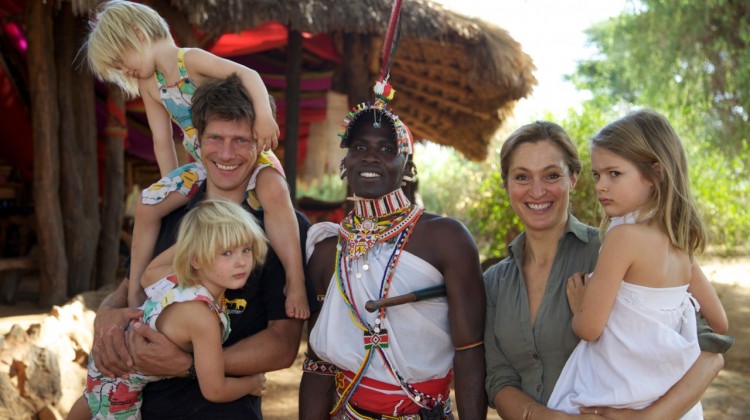
Q1 When did you first come face to face with an elephant?
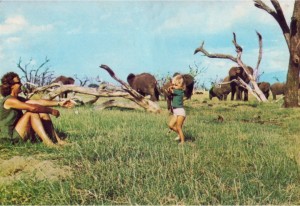
Young Saba with her dad, Iain Douglas-Hamilton and elephants image credit Saba Douglas-Hamilton
The first time I met an elephant was when I was a babe in arms at six weeks old, when my mother introduced me, on foot to a very special elephant in Manyara, Tanzania, called Virgo. She was a completely wild elephant who had become habituated to our family over the years, and being naturally rather friendly and curious, had got into the habit of coming up to greet us. As she got to know my father – a rather unusual primate, from her perspective, who spent a great deal of time lurking around the periphery of her family group – she became interested in what he was getting up to and would often approach to within a few metres. This turned into a bit of a ritual, to the point where my mother felt confident enough to approach her on foot shortly after I was born. Virgo came forward in turn, reached out her trunk and sniffed me from head to toe, baptising me in my first elephant breath. Elephants have been a huge part of my life ever since.
Q2 What’s it like living at the camp? How do you look after your children and keep them from harm?
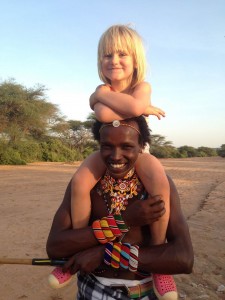
One of the twins with their Samburu babysitter image credit Saba Douglas-Hamilton
Living at Elephant Watch Camp is wonderfully simple. It’s truly one of the most beautiful places I know. Each tent is specially designed to fit under its own tree, so in the morning, as you’re being serenaded by birdsong and the rustling sounds of animals all around; you feel like you’re peeking out from in amongst the roots of the ‘Tree of Life’ as the world wakes up. Despite its simplicity it’s actually very luxurious, you have everything you need and more, but it’s all extremely eco-friendly. The kids have learnt how to be bush-wise, to keep their eyes open for elephants, snakes and scorpions, and look twice if they sense anything unusual. But since they’re still quite little I tend to employ a Samburu warrior to keep an eye on them too. They love him to bits, and he in turn is rather amused by the complexities of herding three little independently-minded pixies.
Q3 What have you learnt since becoming a mother; would you like your daughters to follow in your footsteps?
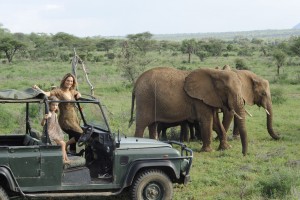
Like mother like daughter image credit Elephant Watch Camp, Samburu, Kenya
The most important thing that happens when you become a parent is that you stop being the centre of your own universe. And it’s such a relief! I also didn’t know that I would have the capacity to love so much, and that you love each child in a completely different way. It’s been the greatest adventure having kids. I would like my daughters to follow their hearts and do what they really believe in. I hope that through their upbringing they will care for the same things that I do – and I’m glad to say that I see the signs already in my eldest child – but they must choose their own paths.
Q4 How did you meet your husband, Frank?
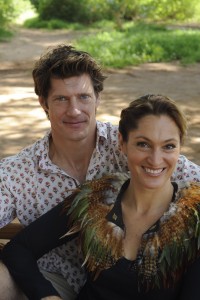
Frank Pope and Saba Douglas-Hamilton image credit Tim Beddows
“it was a miracle I even met my husband, Frank Pope, at all!” – Saba
When I started working with the BBC in 2000 I was away a lot from Kenya, travelling to remote wildernesses across the world to film a huge variety of rare or endangered animals, so it was a miracle I even met my husband, Frank Pope, at all! But as luck would have it I happened to be in the UK for meetings at the BBC when a friend was getting married, and that’s where my husband and I met in 2004, in Henley on Thames. He was very handsome and wearing a bright green suit which rather stood out. I only learnt later that he was colour-blind! He’d recently returned from Vietnam where he’d been working with a marine archaeologist on the deepest excavation ever attempted, and at the time we met was writing a book about his experience which was later published as ‘Dragon Sea’.
Q5 What’s it like bringing kids up in the bush and any advice for families travelling to Africa?
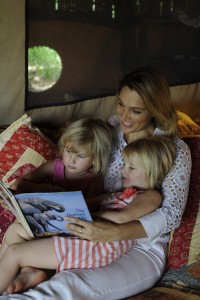
Saba reading an elephant bedtime story image credit Tim Beddows
“I really can’t think of a better place to bring up kids, outdoors in the sunshine surrounded by nature.” – Saba
I really can’t think of a better place to bring up kids, outdoors in the sunshine surrounded by nature. My advice to families travelling to Africa is to come quickly and spend as long as you can out here. Get to know the locals, take time to explore new places, and enjoy the differences in cultures. People are often worried about malaria, but it’s a treatable disease and many areas are malaria free. So as long as your vaccines are up to date and you’re taking a prophylaxis when needed, you’ll be fine. Lots of sunblock, decent sun hats, a good pair of binoculars, diaries and drawing pads are all essential.
Q6 Why do you love elephants?
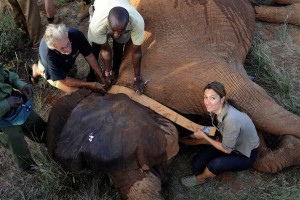
Iain, researcher and Saba with an elephant image credit Elephant Watch Camp
Elephants are special because they are highly intelligent, sentient creatures that share much in common with us. They are self-aware, feel complex emotions like empathy and compassion, and even have a sense of their own mortality, all of which suggests a kind of consciousness that is similar to our own. They are sensitive, loving, and humorous, and at times real drama queens, but on the whole are always doing something interesting in relation to one other. What appeals to me most is that they are social, immersed in a web of complex relationships. The more you get to know them as individuals, the more you understand that each elephant has its own unique personality and character, is defined by its life experiences, and relies heavily on the elephants it knows for love and support. All of which is very similar to humans.
Q7 What challenges lie ahead for elephant conservation? What is the current situation with regards to ivory poaching?
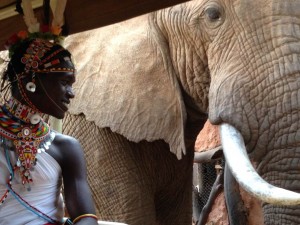
Samburu Simon Lekalaile in the camp with an elephant image credit Saba-Douglas-Hamilton
Currently, the illegal ivory trade is the greatest threat to elephants, but hard on its heels comes loss of habitat and human encroachment. Elephants are in crisis across Africa. While we are having some success with anti-poaching efforts in Kenya, it’s a far cry from what’s happening across the rest of the continent. Save the Elephants data shows that 100,000 elephants were killed in Africa between 2010 and 2012, and sadly the rate of killing has continued unabated ever since then. We need urgent action internationally if we are to prevent the loss of elephants in the wild in our lifetime. Most importantly, we need China – which is currently the biggest market – to ban its domestic ivory trade. If they did that one thing it could be a complete game changer.
Q8 Tell me about your family’s involvement with Save the Elephant charity?
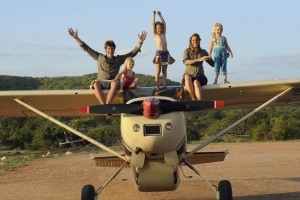
Pilot and husband Frank, with Saba and daughters, image credit Elephant Watch Camp, Samburu, Kenya
My father, Iain, founded Save the Elephants (STE) back in 1993. My husband, Frank, joined the charity three years ago as Chief Operations Officer. When the elephant poaching crisis began to escalate, we needed all hands on deck, so he signed up to the cause and has never looked back. STE is a small, nimble NGO, thoroughly grounded in scientific research that punches way above its weight. Through detailed long term monitoring of a known population of over 1,000 elephants, and 18 years of research on long-distance movement, their data is crucial for landscape planning in a rapidly changing world. STE acknowledges the urgent need for development in Africa, but if this is done correctly with the needs of the animals and wider ecosystems in mind we can have the best of both worlds: a modern Africa with intact ecosystems (on which we depend for our survival) and abundant wildlife. STE is also at the forefront of a coalition fighting to stop the illegal ivory trade. STE’s Elephant Crisis Fund (ECF), run in conjunction with the Wildlife Conservation Network in the USA, gets 100{13c8d4b31df5f805556ed83a8829bbffcaa4563894948df0cae38482b102b43c} of funds out to the areas that need it most – to the frontline in the anti-poaching war to stop the killing, towards efforts to thwart the traffickers, raise penalties and ensure prosecution, and finally to outreach efforts in China to reduce demand.
Q9 What can tourists do to help?
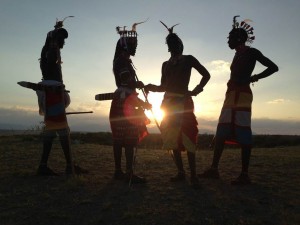
Samburu dancing at sunset image credit Saba Douglas-Hamilton
Right now, we need people to come to Kenya urgently to show their love and concern for wildlife by visiting the protected areas and national parks. Eco-tourism brings desperately needed funds to wildlife areas which helps keep conservation efforts going. Without tourist dollars conservancies find it hard to support the people who’ve given their land over to wildlife, and national parks and protected areas struggle to pay salaries or put fuel in anti-poaching vehicles, so the wildlife suffers as a result. Kenya is actually a very safe country. I live here with my children. And when you visit as a tourist you are looked after from the moment you arrive until the moment you leave. So come to Kenya! Come see the elephants of Samburu and stay with us at Elephant Watch! Experience the wildebeest migration in the Mara, swim in the gloriously warm Indian Ocean, and join hands with us to fight for the elephant cause. The more people who can get involved in conservation efforts by fund-raising or spreading the word about the ivory crisis, the better. Save the Elephants (STE) needs all the support it can get to continue it’s good work, so having dinner parties to raise money for the Elephant Crisis Fund (ECF) or STE’s long-term research is greatly appreciated.
What next?
We would love to hear from you, no matter how early in the planning process you might be for planning an elephant family safari in Africa. We’re passionate about Africa and would be happy to chat about creating your tailor made luxury safari. Our team of experts have travelled widely throughout Africa. They can offer expert advice on every type of safari from family and beach holidays to riding and primate safaris. If you would like to talk to someone who has been there and done it, please just send us an email or give us a call.
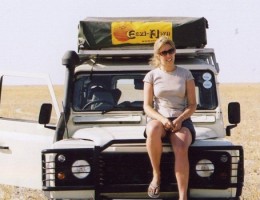
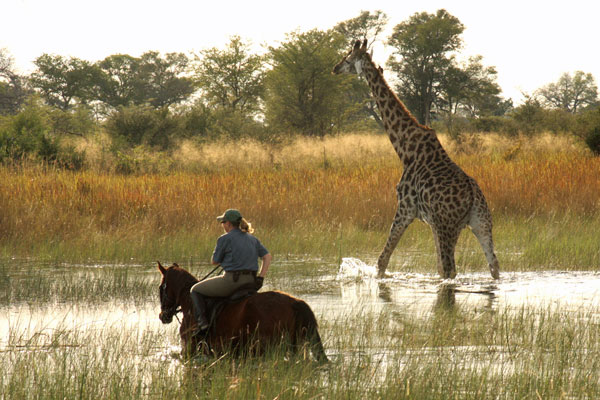
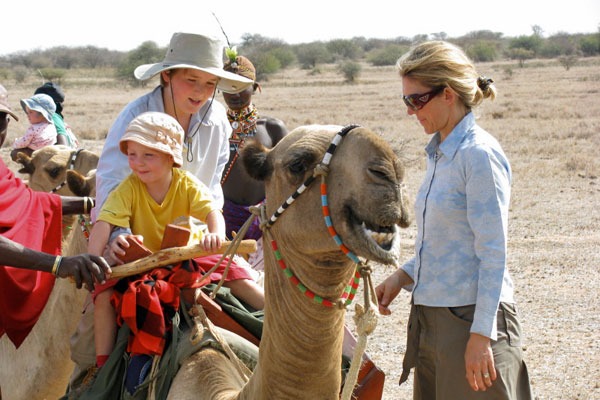 Camel safari, Kenya, Laikipia,
Camel safari, Kenya, Laikipia, 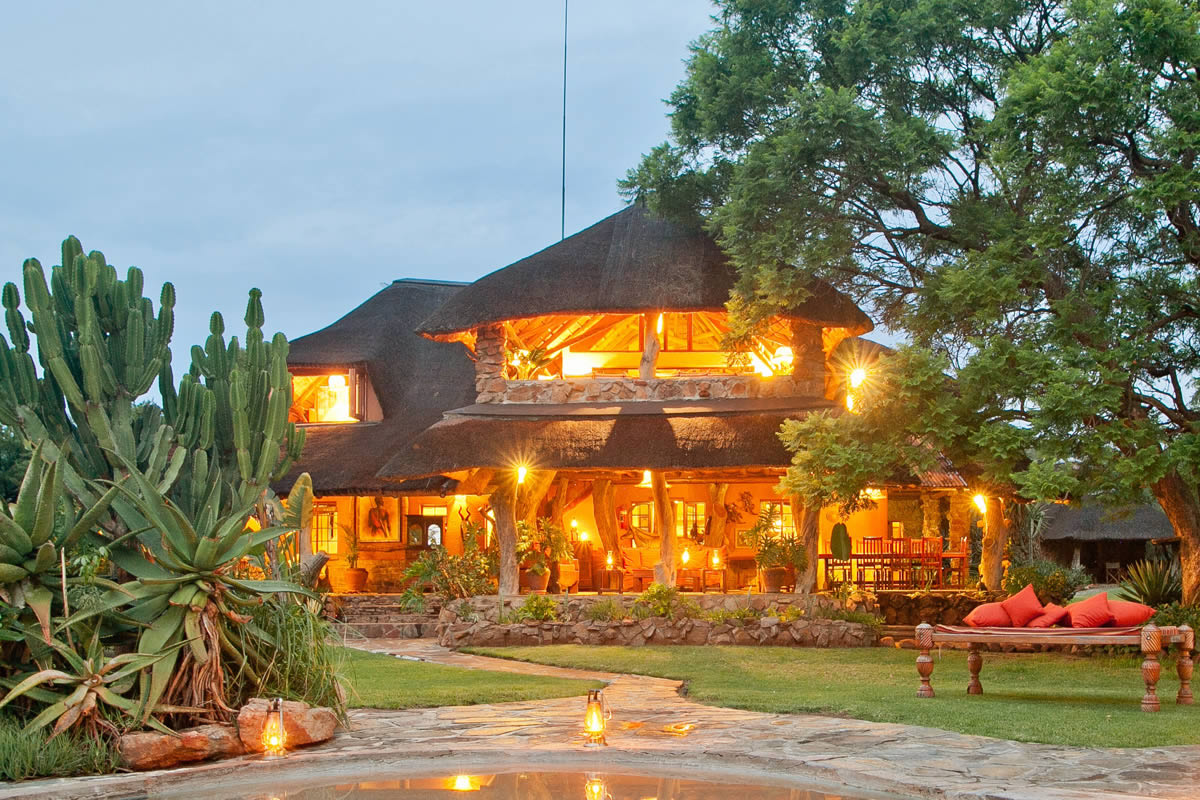 Luxury safari accommodation Waterberg, South Africa,
Luxury safari accommodation Waterberg, South Africa, 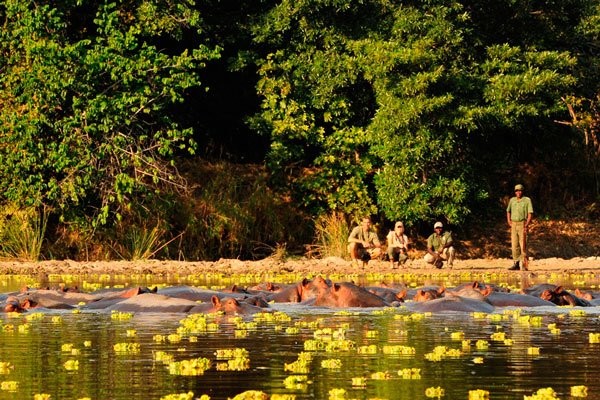 Hippos on a walking safari, South Luangwa, Zambia,
Hippos on a walking safari, South Luangwa, Zambia,
Ure doing a brillant job,ure hard work dedication,ure family with u, ☺☺☺
Dear SABA – I have been totally enraptured and ‘swept away’ again by the repeat showing of ‘THIS WILD LIFE’ – I feel as though I have been there and got to know you all -we have followed your ‘life’s journey’ since you first came on screen – esp. the marvellous first elephant series and the magical leopard ones – sometimes with Jonathon Scott —
Our daughter Anuschka now Schofield has been at the BBC Bristol producing and directing wildlife films((incl. Ocean Giants/Life of Mammals etc. for the last 25 years -many with David Attenborough; has just won a special award for producing ‘Zoo Quest’ with him bringing his first world adventures when 28 yrs. ! into crystal clear colour – My main passion is to paint wild animals esp. elephants, big cats for Conservation.
Sadly I am now 76/husband 85! so do not have huge funds to help more than to the WWF & Tusk etc. but having had 4 children now in their late 40’s (incl, identical twin sons!- 1 in Sydney the other in London -all desperate to help stop poaching; loss of habitat but often making people aware on-line; encouraging donors. We have been to Kenya; the Massai Mara but sadly cannot any more though my dream would have been to come to Elephant Watch as you and your wonderful husband (+ gorgeous children!)have made your Camp the most idyllic/natural/educational; alluring safari base we have ever seen or heard of with the potential to help these incredibly intelligent; empathetic animals and so full of admiration for the tireless work of your father.
So this wonderful series is the next best thing when one is’ stuck’-in S,W, Dorset! Thank you for all the joy you have given us -Please send me any info./leaflets etc, you have so we can pass it on to those still able to full-fill ‘the dream’; come to Elephant Watch in Samburu – I SO wish I could find EFFECTIVE* CAR STICKERS- esp. LONG ONES for REAR; FRONT car windscreens with your ‘CRIES FOR HELP’ to keep people aware; persuade them to donate – With all the troubles in this world it is SO VITAL TO KEEP REMINDING PEOPLE ABOUT THE PLIGHT of these MAGNIFICENT CREATURES. Also please let us know when your next programme is due.? all our Very best wishes- Annette &; Raoul.
Dear Saba and family,
My family and I are fans of your program, we look forward every week Thursday night RTE 2 (Irish tv). You doing a good job and we plan to visit in the near future. A big shout out to all in the camp, love from Ireland.
Saba I like your work for wild animals I am interested also I want to work with you please give me a chance please
Dear Malik
Please contact Saba directly about employment on her website https://sabadouglashamilton.com/ Good Luck Renate
Saving the elephant goes hand in hand with saving all flora and fauna that live in an elephant’s habitat, and that is truly wonderful. For the health of mankind, let alone wildlife, the preservation of nature should be a priority, but population pressures are becoming greater. It’s a tragedy that millions of women in the developing world do not have a chance to choose the number of children they would like to have as they rarely have access to family planning. This traps them in poverty and has many negative consequences for the environment, humans and wildlife suffering the loss of life sustaining habitat. By 2050, the World Population is estimated to be 10 billion (currently 7.7 billion). This is an issue than cannot be shied away from, however controversial, and there are voices trying to be heard. Help the poor to climb out of poverty through being able to plan their family size, and at the same time, save pressure on the environment, enabling space in which wildlife can live.
Been watching you programs on your adventure , may my wife and I congratulate you on success and long may you continue to do so we would love to visit you but due to fanatical reasons we can not but keeping up with you on the Internet will have to sufice .
Long may your good cause live and prosper .
Kind regards Tony & Christine
Dear Saba and Family
I have only just come across your programme This Wild Life and I am captivated by it.
What shines through is your total respect for the country, its people and customs. The best wild life programme I have ever seen.
A bout 25 years ago I was privileged to stay in Lloyd’s Camp in the Okavango Delta in Botswana. It was unforgettable.
Best wishes to you all.
Dear Glenys, thank you for your kind message. All the best, Katy
Saba & Frank hi I hope you consider scheduling a date the next time you’re in the UK to come to N.Ireland ? The public ( North & South) are interested in supporting you to continue to protect and raise awareness of the elephants etc there. Are you on television any time soon ? Thoroughly enjoyed your programmes
Dear Patricia, I am not sure what Saba’s plans are for the future, her website has lots of information https://sabadouglashamilton.com/ including detials of how you can help support. If there is anything we can help with in the meantime please do get in touch. All the best, Katy